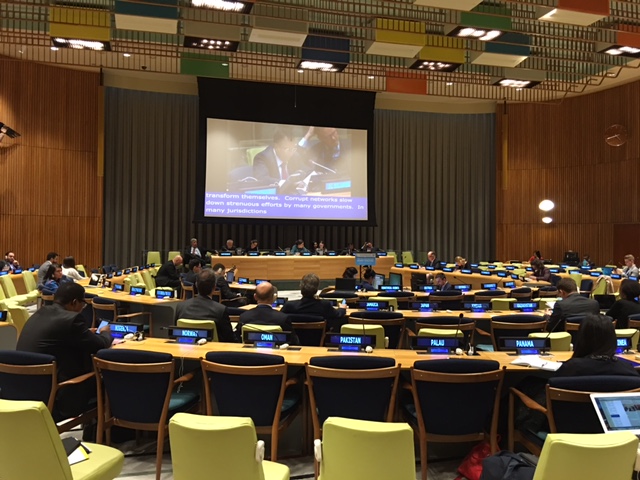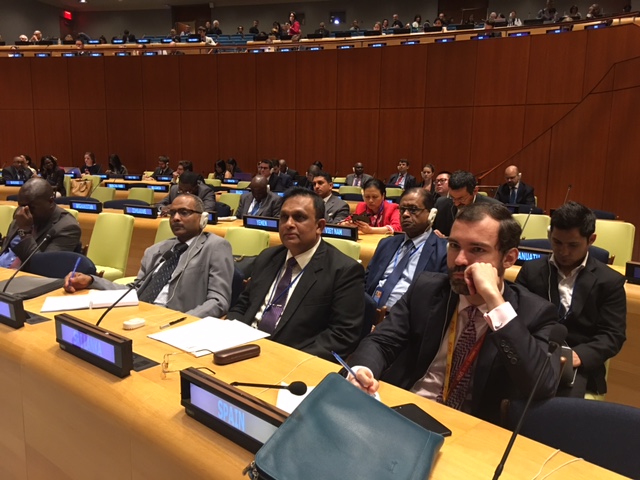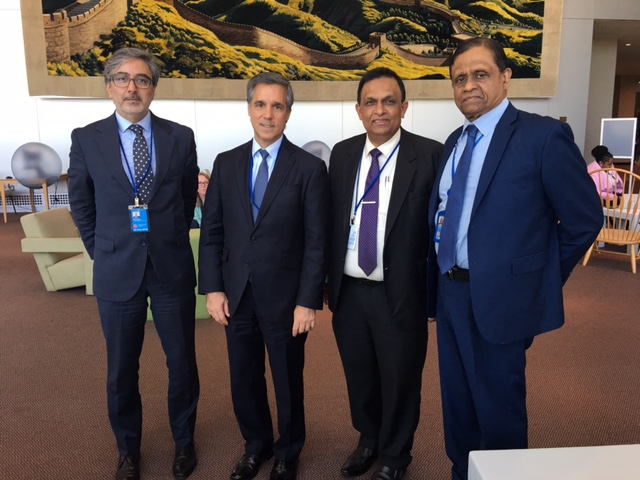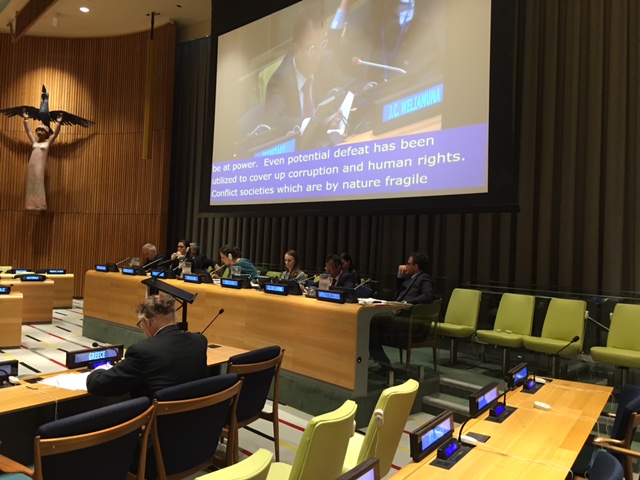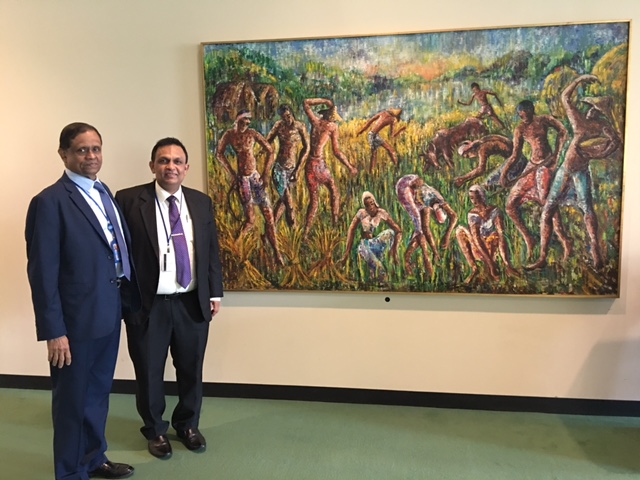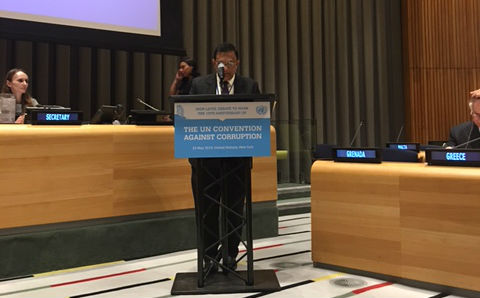 Statement by Mr.Sarath Jayamanne, President’s Counsel, Director General of Commission to investigate Allegations of Bribery or Corruption-Sri Lanka
Statement by Mr.Sarath Jayamanne, President’s Counsel, Director General of Commission to investigate Allegations of Bribery or Corruption-Sri Lanka
at the High-Level Debate of the General Assembly
to mark the 15thAnniversary of the Adoption of UN convention against Corruption (UNCAC)
Emerging Trends and Promoting the effective implementation of the convention
Wednesday, 23 May 2018, New York, USA
High Level Segment
10:30AM-11:15AM
Three (3) Minutes
----------------------------------------------------------------------------------------------------------------
Mr Chair,
Distinguished delegates,
At the outset let me say how happy I am to be here today, to mark the 15th Anniversary of the United Nations Convention againstCorruption (UNCAC)– which provides a universally accepted legal framework for combating corruption.
Sri Lanka has adopted a holistic approach to fighting corruption by targeting all relevant institutions at all levels to meet the unique challenges of combating this scourge. Therefore Sri Lanka remains fully committed to implementing the provisions of the Convention in an effective manner.
Mr. Chair
The Nineteenth Amendment to the Constitution of Sri Lanka was one of the first steps taken by a new administration in 2015 stating their commitment to democracy, good governance, independence of the judiciary, and the rule of law. This amendment, established independent commissions for namely: the Judicial services, Police, Public Service, Human Rights, Elections, Finance, Audit and of course the Commission to Investigate Allegations of Bribery and Corruption (CIABOC) of which I am Director General.
This gave new life to existing institutions with an anti-corruption mandate and also formed new bodies charged with fighting corruption. Significantly, it recognized the importance of implementing the provisions of UNCAC.
Mr Chairman,
May I say, that CIABOC,just last month, arrested two high ranking officialsat the highest levels of government on charges of bribery. This not only demonstrated the independence of our body,but also the policy of non-interference practiced by the government. These arrests marked a landmark in our work on anti-corruption, as this was the most high ranking official to have been arrested,while in office, in 60 years.
Ensuring the independence of these Commissions from any kind of political influence is crucial in fighting corruption and restoring confidence in the system.
Mr. Chairman,
We are pleased that the Implementation Review Mechanism of UNCAC has demonstrated its value exceeding our expectations. Indeed, it sets a gold standard for other treaties covering crime prevention and criminal justice.
The Implementation of Chapter III (Criminalization) and Chapter IV (International Cooperation) of the UN Convention against Corruption was completed through the Implementation Review Mechanism in 2013. The second review cycle covering the implementation of Chapter II (Prevention) and Chapter V (Assets Recovery) of the convention was completed last year following the submission of the completed Self-Assessment Checklist by Sri Lanka. We are very happy to share with you that the Sri Lanka was among the first countries selected for the second review cycle, and our experience from actively participating in the two review cycles has been both rewarding and enlightening.
We note with appreciation that the UNODC has visited Sri Lanka on three occasions in connection with our work on anti-corruption, and is currently assisting in our capacity building efforts. To this end I am happy to announce that Sri Lanka will be hosting this July, a Global Expert Group meeting organized by the UNODC together with the UNDP and Transparency International. The decision to hold this meeting in Sri Lanka was in recognition of the active role played by us in the region in combating corruption.
Mr. Chairman,
Among our recent achievements we count as significant, the amendment,after a period of over 24 years, of several anti-corruption laws, namely, the substantive bribery law, the procedural CIABOC law and the Asset Declaration law. Towards this end, we have had several rounds of discussions with the World Bank and UNODC and we thank them for their assistance.
Moreover, Sri Lanka’s Cabinet has now given CIABOC the mandate to prepare a NationalAction Plan. In this regard we are currently conducting island wide national consultationsto create awareness and obtain the views of public officials including members of civil society to draft a prevention strategy and strengthen the enforcement machinery of the country.
We have identified through this productive engagement, ‘action points’ in the policy, legal, legislative and executive domains. We have now embarkedon a progressive transitioning of CIABOC from its current position to a fully-fledged, premier anti-corruption institution by increasing capacity and making crucial and innovative changes where needed.
Mr Chairman,
There can be no sustainable development if corruption abounds. Which is why, today’s debate,aptly focuses on the implementation of the UN Convention against Corruption as paving the way to achieve the 2030 Sustainable Development Agenda. Sri Lanka is committed to enhancing the principles of public trust doctrine, principle of inter-generational equity and preserve the national wealth for the future generations.
We are committed as I said before to promoting the objectives of the Convention. This includes pursuing effective follow up,establishingpartnershipsin order to share intelligence and best practices,and follow the money. It is vital also, to createanti-corruption networks including with financial institutions,for the purpose of the recovery of stolen assets from foreign jurisdictions. In order to achieve this, international cooperation is key. While we acknowledge with appreciation the cooperation that currently exists, there needs to be more engagement to achieve the objectives envisaged in the Convention.
I thank you, Chair.




